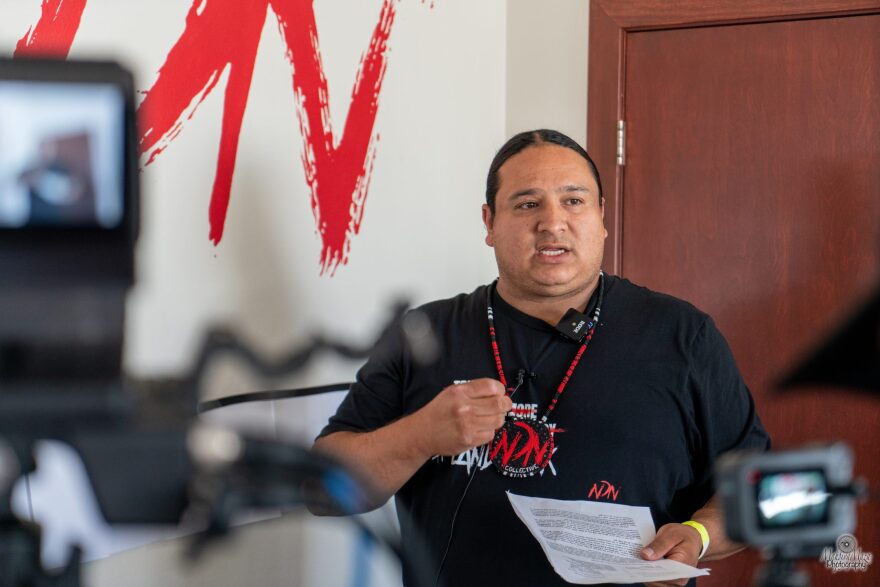No strings are attached to $50 million that a South Dakota nonprofit will use to bridge wealth disparities in Native American communities.
The Bush Foundation, based in St. Paul, Minnesota, has established a trust to redistribute $100 million to Black and Indigenous communities in South Dakota, North Dakota and Minnesota with two steward organizations at the helm.
NDN Collective of Rapid City will steward $50 million to Indigenous people and Nexus Partnerships of Minnesota will steward $50 million to Black communities.
Nick Tilsen, president and CEO of NDN Collective, says the grant is profound.
“The Bush Foundation didn't wake up one day and say they were going to do this, you know? The reality is after the death of George Floyd happened, an uprising happened throughout this whole country calling out the racial inequities that exist.”
'Cannot be business as usual'
Tilsen is referring to the 2020 murder of Minneapolis resident George Floyd, a Black man who was killed by white former police officer Derek Chauvin. Chauvin recently pleaded guilty to federal charges of violating Floyd’s civil rights, after being convicted of murder and sent to prison. Globally, solidarity protests erupted after Floyd’s death. In a July 2020 statement, The Bush Foundation said it was committed to reprioritizing its funding.
“For the Bush Foundation and for institutions all over this region, it cannot be business as usual.”
The Community Trust Fund is just that, not usual. The funds are flexible and devoid of means testing. NDN Collective and Nexus can use the money in any way they see fit for their communities. Nick Tilsen lists some possibilities.
“Down payment assistance for homeownership, a down payment for people trying to start a business in their community, to create a livelihood for somebody who is trying to get into higher education. Somebody who needs to make repairs on their home, a spiritual leader who might need to build a ceremony house for their ceremony practices – so different things that are related to building assets and building wealth.”
Because the funds are so flexible, they can reach beyond what foundations typically identify as avenues to build wealth.
“It’s not just financial but there's important parts of our culture as Indigenous people that are fundamentally part of our definition of wealth,” Tilsen says. “So we are broadening that definition and really redefining it on Indigenous terms, so there's going to be some things in there like supporting folks to learn their language and supporting culture and ceremonial work, because we also see those as assets.”
Working on wealth gaps
NDN Collective has been doing economic redistribution since its inception. So far, Tilsen says the organization has distributed $25 million to 530 Indigenous organizations throughout North America. This is in line with the group's mission to build the collective power of Indigenous people.
Bush Foundation Grantmaking Director Eileen Briggs acknowledges that racial wealth gaps are not created overnight and won’t be solved overnight.
"We believe that addressing wealth gaps is one of our most important things we can do for our region. We know racial wealth gaps are generational and really reflect long-term, race-based policies in the U.S."Eileen Briggs, Bush Foundation
“We aren't under the illusion that $100 million is going to make a significant dent, but we do feel it is raising the issue to the front of mind. …. We believe that addressing wealth gaps is one of our most important things we can do for our region. We know racial wealth gaps are generational and really reflect long-term, race-based policies in the U.S.”
Briggs says data show how the racialized wealth gap persists. She says the average Black household in 2019 had 13 cents for every dollar of wealth held by white households. The last year Native wealth was measured in 2000, the typical Native household had 8 cents for every dollar of wealth held by a white household.
Bush Foundation history
Through their own research, the Bush Foundation has found throughout U.S. history, policies that were successful at building wealth for white Americans did not benefit Black and Native Americans in the same way. A look at the history of the Bush Foundation can illustrate this concept.
The foundation was founded by its namesake, Archibald Bush, in 1953. Bush was born to a white family in Granite Falls, Minnesota, in 1887. Native Americans had occupied the land surrounding Granite Falls for thousands of years until white settler encroachment led to the U.S.-Dakota War of 1862. Minnesota Gov. Andrew Ramsey declared, "the (Sioux) Indians of Minnesota must be exterminated or driven forever beyond the borders of the State." After the war, surviving Native people were forcibly expelled and brought to the Crow Creek Reservation in South Dakota.
Archibald Bush moved to Duluth, Minnesota, and began working at 3M just shy of a decade after the Minnesota, Mining and Manufacturing company was founded. Bush invested in company stock early. As the Minnesota, Mining and Manufacturing company grew, so did the value of those stocks. With no children to inherit the fortune that grew from those early investments, Bush used it to establish the Bush Foundation in 1956. If Bush had children, the money that went to the foundation might have been passed down and kept within his family – a concept referred to as generational wealth.
For NDN and Nexus, comprehensive planning including the formation of focus groups will begin in January and continue through the New Year. Applications for redistribution grants are anticipated to be open to individuals and families by late 2022. To stay up to date with stewardship progress, NDN Collective and Nexus Community Partnerships have individual newsletters.


